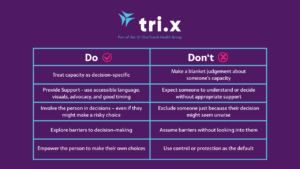Have you ever wondered how capacity is assessed across different age groups?
Last month, we brought together two of our Consultants, Beena and Maxine, to unpack how the law works, what good practice should look like, and why understanding capacity is everyone’s business.
Both Beena and Maxine are registered social workers with decades of frontline experience, Beena in children’s services and Maxine in adults’ social care. Between them, they’ve spent years developing policies, writing reports, and shaping guidance. But now, they’ve set themselves a different challenge: writing a blog.
“This is harder than a policy!” they laughed.
“But mental capacity is too important to not write about, so here we go…”
Despite working in different sectors, they discover that their principles, challenges, and approaches aren’t so different after all.
Beena’s Perspective: Capacity in Children
Beena specialises in children’s legislation and practice guidance, drawing on years of experience as a social work practitioner and safeguarding lead.
“When we’re assessing children under 16, we use Gillick competence and the Fraser guidelines. There’s no single test; it’s all about the child’s ability to understand the specific decision in front of them.”
Some of the key areas Beena looks at include:
- Age and maturity
- How complex the decision is
- Barriers to understanding (e.g. disability, trauma, language)
- Whether additional support could help them engage, and
- When capacity isn’t there, someone with parental responsibility must give their consent.

Maxine’s Take: Capacity from 16 Onwards:
Maxine, a long-time expert in adult safeguarding and legal literacy, has worked across mental health, hospital discharge, and complex care settings. Now she works on procedures for tri.x.
“From age 16, we shift to the Mental Capacity Act 2005, and it’s not about making ‘good’ decisions, but about whether the person can understand, retain, use, and weigh the information.”
Maxine applies the five core principles of the Mental Capacity Act:
- Always presume capacity
- Offer support to decide
- Don’t judge based on outcome
- Keep it decision-specific
- Act in the best interest if capacity is lacking
Like Beena, she focuses on barriers: communication, timing, environment, or temporary health factors.
“Capacity assessments should never be tick-box exercises; they’re relational, nuanced, and deeply human.”

What They Agreed On:
Together, Beena and Maxine mapped out the shared values that cut across all ages:
Capacity Do’s and Don’ts

Beena and Maxine may come from different worlds, children’s services and adult social care, but their reflections reveal a powerful truth: mental capacity isn’t a siloed issue. It’s a thread that runs through every decision, every age group, and every service.
Whether you’re working with a child or young person navigating consent or an adult facing a complex life choice, the principles remain the same: assess each decision individually, offer the right support, and never lose sight of the person at the heart of it.
At tri.x, we believe that understanding capacity isn’t just a legal requirement; it’s a human one, and whether you’re writing policy or working on the frontline, it’s everyone’s business.
So next time you’re faced with a capacity question, pause and ask:
“Have I empowered this person to decide, or have I simply decided for them?”
That’s where good practice begins.
This blog was brought to you by the Lead Consultants of tri.x.
